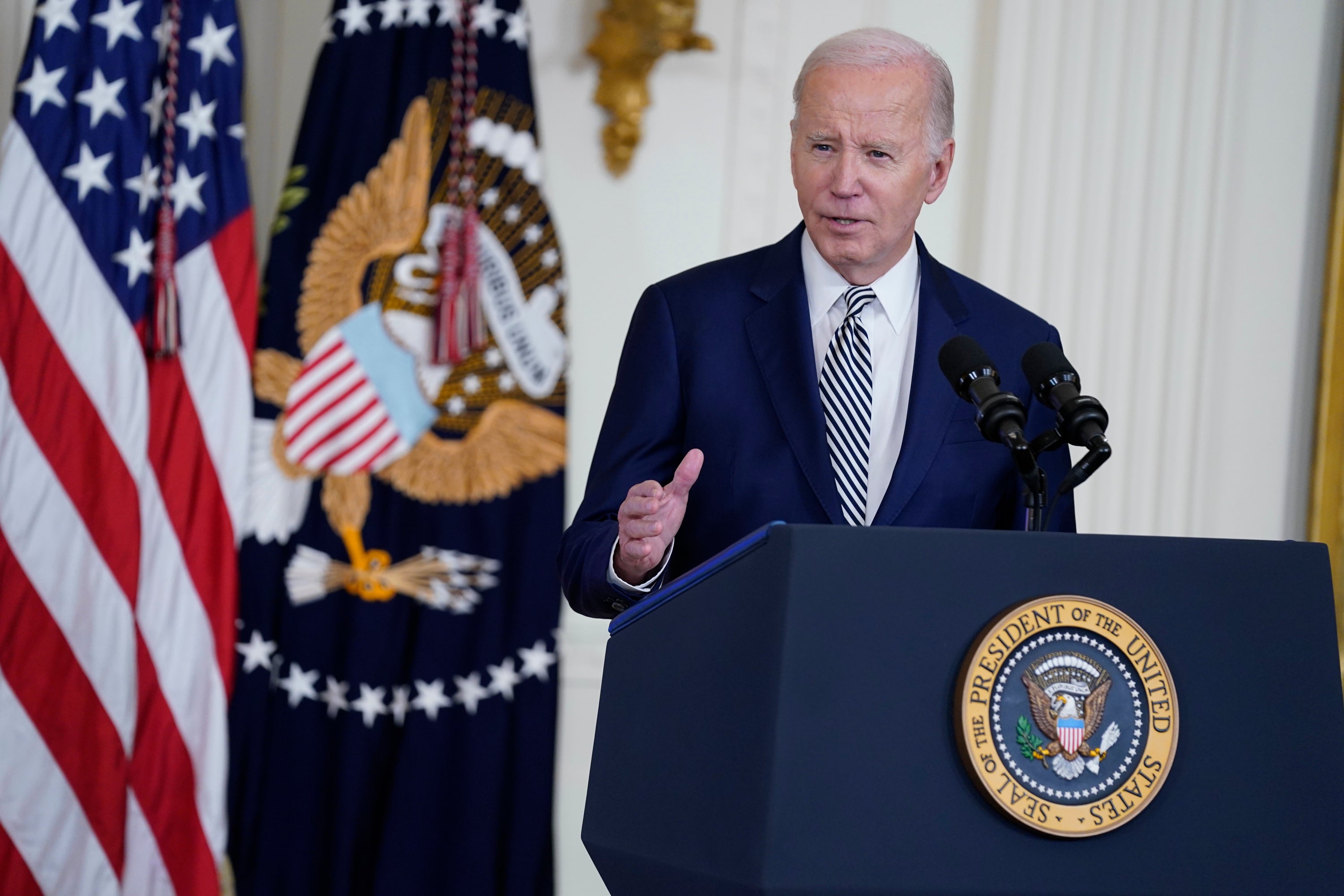Biden heads to Las Vegas to showcase $8.2B for 10 major rail projects around the country
President Joe Biden is heading to Las Vegas to showcase $8.2 billion in funding for 10 major passenger rail projects across the country

Your support helps us to tell the story
From reproductive rights to climate change to Big Tech, The Independent is on the ground when the story is developing. Whether it's investigating the financials of Elon Musk's pro-Trump PAC or producing our latest documentary, 'The A Word', which shines a light on the American women fighting for reproductive rights, we know how important it is to parse out the facts from the messaging.
At such a critical moment in US history, we need reporters on the ground. Your donation allows us to keep sending journalists to speak to both sides of the story.
The Independent is trusted by Americans across the entire political spectrum. And unlike many other quality news outlets, we choose not to lock Americans out of our reporting and analysis with paywalls. We believe quality journalism should be available to everyone, paid for by those who can afford it.
Your support makes all the difference.President Joe Biden is heading to Las Vegas to showcase $8.2 billion in funding for 10 major passenger rail projects across the country, including to spur work on high-speed, electric train routes that could one day link Nevada and California, as well as Los Angeles and San Francisco.
The administration says the 218-mile (350.8-kilometer) train route linking Las Vegas and Rancho Cucamonga, California, about 40 miles (65 kilometers) east of downtown Los Angeles, may one day serve more than 11 million passengers annually.
The administration hopes the investment through federal and state partnership programs will help to boost prospects for the long-discussed project, which supporters say could revitalize travel in the American West and critics argue is too costly.
Another electric rail line getting funding has been billed as the nation's first high-speed route and is eventually planned to traverse California's Central Valley and extend to San Francisco and on to Los Angeles, with trains reaching up to 220 mph (354 kph).
The funding the president will highlight won't be nearly enough to cover the full costs of either project, but signals the Biden administration's commitment to spurring train travel in a nation that has long celebrated the spirit of fast cars and open highways.
“The bottom line is that, under President Biden, we’re delivering world class passenger rail service that Americans ought to be able to expect,” Transportation Secretary Pete Buttigieg said on a conference call with reporters.
Other train projects getting funding include upgrades to heavily traveled corridors in Virginia and North Carolina, with the eventual goal of linking Richmond and Raleigh by rail. Funding will also go to improvements to a rail bridge over the Potomac River to bolster passenger service in Washington and cover train corridor upgrades in western Pennsylvania and Maine, while expanding capacity at Chicago’s Union Station, one of the nation’s busiest rail hubs.
The announcement aside, White House press secretary Karine Jean-Pierre said Biden also would use his visit to Las Vegas to address this week's shooting at the University of Nevada, Las Vegas, that killed three people and wounded a fourth. He is to end the day in Los Angeles at a fundraiser featuring entertainment industry luminaries.
Friday’s trip was planned before the shooting and Biden's focus on train service is little surprise for a president who is a big passenger rail advocate. Biden has championed several major federal spending investments in passenger rail travel, including last month when he announced $16 billion in federal investments for rail travel along the busy Northeast Corridor.
During his 36 years as a senator, Biden traveled back and forth from his home in Delaware to Washington daily and says he has logged more than 1 million miles on Amtrak.
Making high speed rail a reality in California won't be easy, though, since its first-in-the-U.S. project has long been plagued by extended deadlines and cost overruns.
The plan has been funded by some prior federal grants, as well as a bond fund approved by voters in 2008, and revenue from the state’s cap-and-trade climate program. But that adds up to a total far below the project’s estimated costs, now at more than $100 billion.
California Republicans have long been critical of the project, but even some state Democrats have become more vocal in their skepticism.
Construction and land acquisition is underway in the Central Valley. But Brian Kelly, the project’s CEO, has long said a fresh infusion of federal cash is an important part of advancing the project. The Biden administration had previously signaled support for the project when it restored nearly $1 billion in federal money that the Trump administration tried to revoke.
Asked about rising costs and growing delays on the high-speed line, Buttigieg acknowledged, “They are facing a lot of the challenges that come with being the very first at anything.”
“For all of these projects, we would not be funding them if we did not believe they can deliver,” he said.
___
Associated Press writer Kathleen Ronayne in Sacramento, California, contributed to this report.